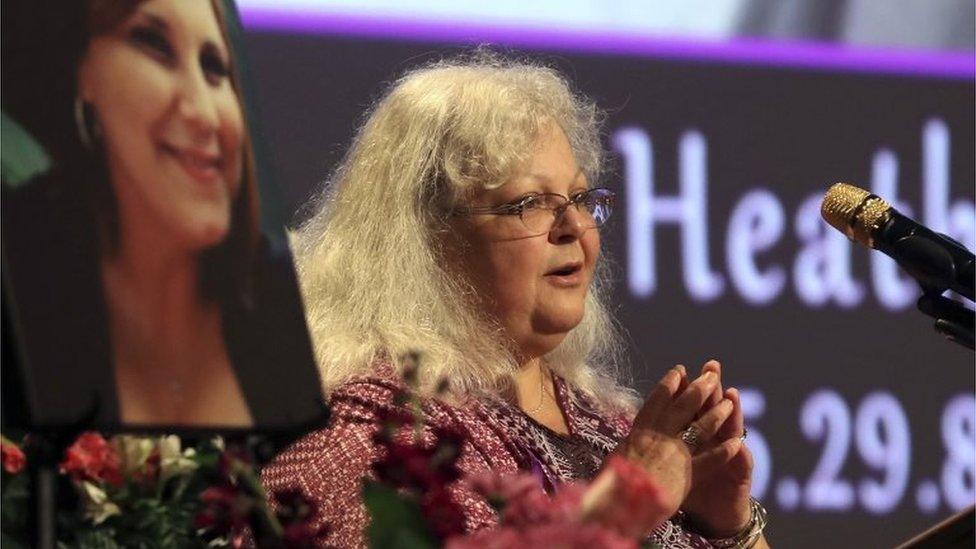Charlottesville victim's mum rebukes Trump
- Published

The mother of a woman fatally run over by a car at a far-right rally in Virginia says she has "no interest" in speaking with President Donald Trump.
Susan Bro said she refuses to speak to Mr Trump after hearing him equate counter-demonstrators, like her daughter, with white supremacists.
Her daughter, Heather Heyer, was killed on Saturday after a car ploughed through a crowd in Charlottesville.
She said she did not "want to be used for political agendas".
Mrs Bro told ABC New's Good Morning America television programme she missed a call from the White House, which appeared to have been made during her daughter's public memorial on Wednesday.
She added that she received three more "frantic messages" from Mr Trump's press team later in the day but was too exhausted from the funeral to talk.
It was when she saw a news clip of Mr Trump again blaming both sides for the violence that she changed her mind about speaking to the president.
Allow X content?
This article contains content provided by X. We ask for your permission before anything is loaded, as they may be using cookies and other technologies. You may want to read X’s cookie policy, external and privacy policy, external before accepting. To view this content choose ‘accept and continue’.
"It's not that I saw somebody else's tweets about him, I saw an actual clip of him at a press conference equating the protesters... with the [Ku Klux Klan] and the white supremacists," she said on Friday.
"You can't wash this one away by shaking my hand and saying, 'I'm sorry.' I'm not forgiving that."
A day earlier Mrs Bro told MSNBC she had received death threats after speaking out about her daughter's death and the president's comments.
Also on Friday, the mayor of Charlottesville, Mike Signer, called for Confederate statues to be removed from the city in order "to repudiate the pure evil that visited us here".
He called upon the state General Assembly to pass laws restricting openly carrying firearms during events, and upon the city to create a memorial to Ms Heyer.
Mr Trump drew outrage this week after reversing his condemnation of Saturday's far-right rally in Charlottesville, Virginia, which was supported by white supremacists and neo-Nazis protesting against the removal of a statue of Robert E Lee, a general who had fought for the pro-slavery Confederacy during the US Civil War.
Susan Bro, Heather Heyer's mother: 'They tried to kill my child to shut her up'
Violent clashes between the rally's supporters and counter-protesters escalated when a car rammed into a crowd of anti-racist demonstrators, killing Ms Heyer and injuring nearly 20 others.
Mr Trump bowed to pressure on Monday to denounce far-right elements at the rally, but appeared to defend its organisers on Tuesday.
He condemned the suspect in the car-ramming incident, but said those who marched in defence of the statue had included "many fine people".
Mrs Bro said her daughter, a paralegal and Charlottesville resident, did not belong to any organised faction of demonstrators, but was "part of a group of human beings who cared to protest".
The president appeared to further his support for the organisers on Thursday when he weighed into a national debate about the removal of controversial statues, including some to leaders of the pro-slavery rebellion defeated in the US Civil War.
Critics say monuments to the Confederacy are racially offensive, but supporters say they are important symbols preserving Southern heritage.
What Trump said versus what I saw - by the BBC's Joel Gunter
In a series of tweets, Mr Trump said the "history and culture of our great country" was being "ripped apart with the removal of our beautiful statues and monuments".
Cities across the country have accelerated planned removals of controversial statues in the wake of the violent protests in Charlottesville.
A statue of Roger B Taney, the US Supreme Court justice who wrote the 1857 Dred Scott decision that upheld slavery and denied citizenship to African Americans, was quietly removed from the grounds of the Maryland State House early on Friday.